10 Digital Tips to Source the Best Bobbin for Your Business Needs
Table of Contents
- Identifying Your Business Needs: Factors to Consider for Selecting Bobbins
- Understanding Different Types of Bobbins: A Comprehensive Overview
- Researching Quality Suppliers: Where to Find Reliable Bobbin Manufacturers
- Evaluating Bobbin Materials: Choosing the Right Material for Durability
- Comparing Prices: How to Find Cost-Effective Bobbin Solutions
- Customer Reviews and Recommendations: Harnessing Feedback for Better Choices
- Maximizing Efficiency in Textile Manufacturing: The Impact of FC Chopped Stitch-bonding Machine on Production Metrics
- FAQS
- Conclusion
- Related Posts
In the constantly changing world of textiles and machinery, picking the right bobbin for your production line is more important than you might think. At DANYANG YIXUN MACHINERY CO., LTD, we’ve got your back. We’re a top-notch manufacturer specializing in multiaxial and biaxial warp knitting machines, stitch bonding warp knitting machines, and towel warp knitting machines. We know that the quality and fit of your bobbin can really make a difference—impacting how smoothly your operations run and how much output you get. As you dig into the details of choosing the perfect bobbin—whether it’s about material, size, or whether it works with different textile applications—our team’s got some handy tips to help you find the best fit for your specific needs.

Whether you're dealing with glass fiber, a combination mat, or chopped strand mat rovings, the key to getting the most out of your equipment starts with selecting the right components. So, stick with us as we share ten simple yet crucial digital tips to make sourcing your bobbins a whole lot easier.
Identifying Your Business Needs: Factors to Consider for Selecting Bobbins
When you're trying to pick out the right bobbin for your business, the first thing you should do is figure out what you really need. Think about the kinds of fabrics you'll be working with—different materials often mean you need different thread tensions or bobbin sizes. For instance, if you're sewing with lightweight fabrics, a finer bobbin might do the trick. On the flip side, heavier stuff could call for something more sturdy. Also, it’s super important to make sure the bobbin you choose actually works with your sewing machine—because not all bobbins fit every model, and that can really throw off your flow.

Another thing to keep in mind is how much you plan to produce. If you’re running a bigger operation, investing in top-quality bobbins that can handle continuous use will totally save you time and money over the long haul. And don’t forget to consider the cost per bobbin—finding that sweet spot between price and quality can make a big difference for your profits. So, taking the time to think about these things will help you streamline your workflow and boost the overall quality of what you’re making. Trust me, it’s worth the extra effort!
Understanding Different Types of Bobbins: A Comprehensive Overview
When you're on the hunt for bobbins for your business, getting familiar with the different types out there is pretty important. Bobbins come in all sorts of shapes and sizes, each designed for particular sewing machines and tasks. Usually, you'll hear about the likes of class 15, class 66, and class 40—these are the most common and mostly used in both home sewing setups and industrial machines. The American Sewing Guild even points out that picking the right bobbin can really make a difference in how your stitches look. Using the wrong kind can cause tension problems and make your seams look uneven—total headache!
And here's something interesting—according to a recent report from Grand View Research, the global sewing machine market is expected to grow at about 5.2% CAGR from 2021 all the way through 2028. A big part of this growth comes from tech improvements and more and more hobbyists and pros getting into sewing. Also, understanding the difference between metal and plastic bobbins is pretty helpful. Metal ones tend to be tougher and last longer, but plastic ones are usually more versatile and easier to work with. Picking the right type not only boosts your efficiency but can also save you some money in the long run, giving you a bit of an edge in a competitive market.
All in all, knowing your bobbins and making smart choices can really help take your sewing game to the next level.
Researching Quality Suppliers: Where to Find Reliable Bobbin Manufacturers
When you're on the hunt for top-quality bobbins for your business, taking the time to research reliable suppliers is a must. I’d recommend starting with some of the key industry directories and platforms that focus on textile manufacturing stuff. Websites like Textile World and Fabric Suppliers can actually be pretty handy—they help you find trustworthy bobbin makers that match what you’re looking for. Oh, and don’t forget about trade shows and industry events! They’re great not just for networking, but also to get a real feel for the products in person, so you can be confident in your choice of supplier.
It’s also smart to check out online reviews and customer testimonials. Hearing what others have experienced can give you a pretty good idea about how reliable a supplier really is—things like their production speed, delivery timelines, and overall service. And if you’re into social and professional networking, try reaching out to peers or joining online groups related to the industry. Asking for recommendations or sharing your own experiences can be super helpful. All in all, taking the time to carefully explore these resources will put you in a much better spot to find a bobbin supplier that ticks all the boxes for your business needs and quality standards.
Bobbin Types and Their Popularity
Evaluating Bobbin Materials: Choosing the Right Material for Durability
When you're selecting bobbins for your business, picking the right material really matters for durability and performance. You’ll mostly come across plastic, metal, and wood—each with its own perks. Plastic bobbins are pretty popular because they’re lightweight and resistant to moisture, so they work great in places where humidity might cause other materials to falter. Plus, they won’t break the bank, which can be a huge plus if you're watching your budget.
On the flip side, metal bobbins are super strong and last ages, making them perfect for heavier, more demanding jobs. They won’t bend or warp easily, so your production stays smooth and steady. Then there are wood bobbins, which give off a nice, traditional vibe. They’re often used in specific textile projects because their natural properties can actually help with thread tension and keep things steady during sewing or weaving. Figuring out which material fits your particular needs—whether it’s durability, cost, or a certain look—can really help you boost productivity and also make your equipment last longer.
Comparing Prices: How to Find Cost-Effective Bobbin Solutions
When you're on the hunt for bobbins for your business, it's super important to compare prices. You want to find something that's budget-friendly but still good quality, right? So, start by checking out different suppliers and making a list of what they offer. You can hop onto online marketplaces or platforms where loads of vendors showcase their products — this makes it a breeze to compare prices side by side. Don’t just look at the per-piece cost though; remember to peek at shipping fees, bulk discounts, and any promos that might save you a few extra bucks.
Another trick is to get in touch directly with manufacturers or suppliers for quotes. Sometimes you can score a better deal, especially if you're buying in bigger quantities. And hey, don’t be shy about asking for samples before placing a big order — it’s a good way to check the quality and also gives you a bit of leverage when negotiating prices.
Plus, joining industry forums or groups can be a goldmine for tips. Fellow business owners often share their experiences and recommend trusted, cost-effective bobbin suppliers. By mixing thorough research with a bit of outreach and chatting around, you’ll be able to streamline your sourcing and keep your business competitive — all without breaking the bank.
Customer Reviews and Recommendations: Harnessing Feedback for Better Choices
Tapping into customer reviews and recommendations can really make a difference when you're trying to find the best bobbin for your business. In today’s digital world, it’s crazy how easy it is for people to share their experiences online — and these reviews can tell you a lot more than just specs on a product. By reading through what others are saying, you’ll get a good idea of which bobbins are actually popular in your industry, especially when it comes to durability, functionality, and value for money.
Plus, engaging with customer feedback isn’t just helpful; it also helps build trust and a sense of community with your clients. When you showcase real user stories, it makes your business appear more credible, and it opens the door for potential customers to ask questions or share their own insights. Don’t be afraid to follow up with surveys or ask for reviews — it shows you genuinely care about quality and your customers’ experiences. All in all, making the most of customer reviews and recommendations can really point you in the right direction and help you make smarter decisions tailored to what your business needs most.

Maximizing Efficiency in Textile Manufacturing: The Impact of FC Chopped Stitch-bonding Machine on Production Metrics
The textile manufacturing industry is constantly evolving, with technological advancements playing a crucial role in maximizing production efficiency. One significant innovation is the FC Chopped Stitch-bonding Machine, which has demonstrated substantial impact on production metrics. This machine is designed specifically for producing high-quality chopped strand mats and compound mats, essential components in various applications ranging from automotive interiors to construction materials.
With its versatile specifications, the FC Chopped Stitch-bonding Machine offers widths of 2800mm, 3300mm, and 3800mm, catering to a broad range of manufacturing needs. Operating at speeds between 50 to 1300 revolutions per minute, the adaptability of the machine ensures that it can be fine-tuned according to specific product requirements. Its single-bar configuration and eccentric pattern drive mechanism enhance operational simplicity while optimizing production output. As textile manufacturers increasingly seek to improve efficiency and reduce waste, investing in such advanced machinery is pivotal for staying competitive in a rapidly changing market.
Moreover, the implementation of the FC Chopped Stitch-bonding Machine not only elevates production capabilities but also contributes to consistency in product quality. This reliability, combined with the machine's efficient performance, empowers manufacturers to meet stringent industry standards while scaling their operations. The integration of this technology signifies a step forward in textile manufacturing, demonstrating how modern solutions can lead to enhanced productivity and sustainability in the sector.
FAQS
: The most common types of bobbins are class 15, class 66, and class 40, which are used in both home and industrial sewing machines.
Choosing the right bobbin can significantly influence the quality of stitching, with improper bobbins potentially leading to thread tension issues and uneven seams.
The global sewing machine market is projected to grow at a CAGR of 5.2% from 2021 to 2028, driven by advancements in technology and increased demand for sewing-related products.
Metal bobbins are generally more durable, while plastic bobbins offer greater versatility, making it essential for businesses to choose based on their specific needs.
You can find reliable bobbin manufacturers by exploring industry directories like Textile World and Fabric Suppliers, and by attending trade shows and industry events.
Online reviews and testimonials can provide insights into a manufacturer’s production capabilities, delivery times, and service quality, helping you gauge their reliability.
Networking at industry events and connecting with peers allows for the sharing of recommendations and experiences, helping you find trustworthy suppliers for your business.
Consider their reliability, production capabilities, delivery times, and overall service quality as revealed through customer feedback and reviews.
The right bobbin can improve stitching quality and reduce costs associated with thread tension issues, ultimately leading to higher productivity and a competitive edge.
Being aware of market trends helps businesses align their needs with available bobbin types, allowing for more informed purchasing decisions that enhance efficiency and productivity.
Conclusion
When it comes to textile manufacturing, choosing the right bobbin can really make or break your production flow and the quality of your final products. I came across this blog called "10 Digital Tips to Source the Best Bobbin for Your Business Needs," and honestly, it’s a pretty handy guide if you're trying to figure out what kind of bobbin suits your specific needs. It covers the basics—like understanding the different types of bobbins, checking out materials for durability, and finding trustworthy suppliers. It’s really about doing a bit of homework to avoid headaches later on.
And let’s be real, comparing prices and reading customer reviews can save you a lot of trouble and help you make smarter choices that actually fit what your shop needs. As someone working in this field, I totally get how important high-quality bobbins are for machines like multiaxial and biaxial warp knitters—they really do make a difference. Using these digital tips, you can streamline your sourcing process and end up with better results in your textile projects. Trust me, it’s worth it!
Related Posts
-
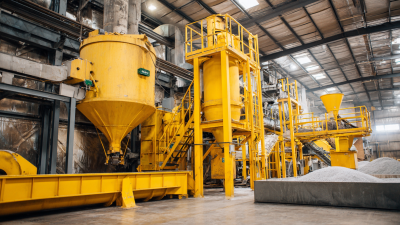
How to Optimize Your Production Line Efficiency with a Multifunction Batching Device
-
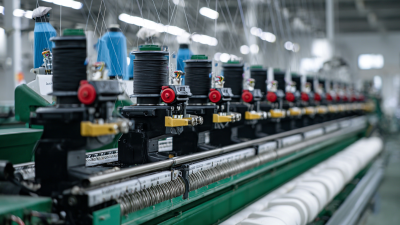
Unlocking Efficiency: Essential Strategies for Sourcing Spare Parts for Warp Knitting Machines
-
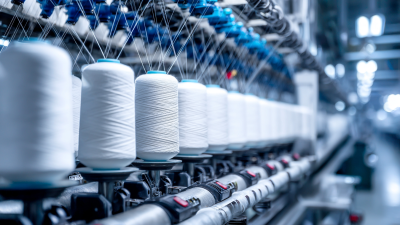
How to Maximize Efficiency with Weft-Insertion Warp Knitting Machines in Textile Production
-
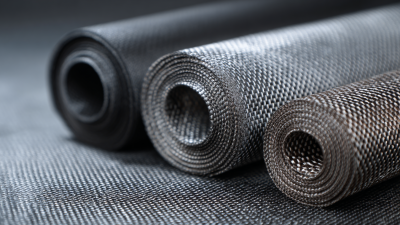
A Comprehensive Guide to Choosing the Right Multiaxial Fabric Cloth for Your Project
-
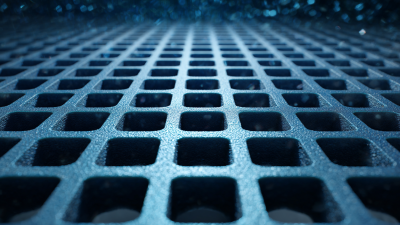
Challenges Encountered with Glass Fiber Grille in Global Market
-
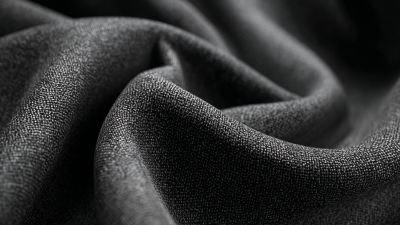
7 Essential Tips for Choosing the Right Industrial Fabric for Your Projects


